A Highland Song review
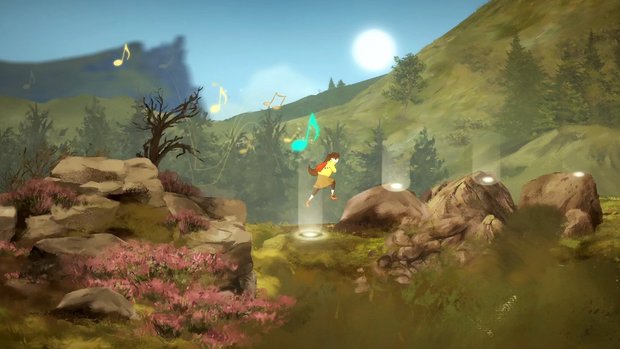
- 0 Comments
A wonderful folksy arrangement of elements capturing both the beauty and challenge of Scottish terrain
These hills are awash with stories.
Some forgotten, some true.
Some beautiful and some cruel.
They're sung, even by the empty hills.
We carry them with us, wherever we go.
– Uncle Hamish
When you think of Scotland, what comes to mind? If it's shortbread-tin views of lush, green hilltops over sunny lochs and heavily muscled men in kilts, well, you've clearly never been here. I mean, speaking as a Scot we do have those, but we also have interminable rain, thistles, and wind that'll blow you into the next valley. It's a land of myths and magic, but also harsh realities, giving rise to a people who are at once gruff and romantic. A Highland Song, the latest effort from renowned British developer inkle, draws on all of that and more to create an adventure that is hands down the most vivid depiction of Scotland and what it means to be Scottish that I've ever seen. In telling the story of a teenager's literal and metaphorical journey to the sea, it blends tales of dragons, shape-shifting selkies, and immortal queens with the pain of scrambling across a cold hillside in a thunderstorm to sleep in the meagre shelter of a cave mouth. At times I went from grumbling with frustration to sighing with wonder in a matter of minutes, but it wouldn't be the full Scottish experience without a generous helping of both.
Moira McKinnon (aka Mollycockles) is a feisty Highland lass, drawn to the mountains that surround her cottage but kept on a short leash by her fearful mother. Her growing frustration comes to a head when her Uncle Hamish, who runs a nearby lighthouse, invites her to come see something special during the Gaelic festival of Beltane. Sitting on the ledge of her open window with her mum going on at her from down below, she looks out at the hills and the sky and decides to just ... go. Just head out with a backpack full of snacks and discover what's out there. And maybe discover her true self in the process.
Of course, this being Scotland, what's out there is lashing rain and howling wind and ankle-turning scree. But also, thanks to Hamish's penchant for telling tall tales sprinkled with myth and legend, Moira is picturing a fantastical world of giants and boggins, witches, and pillars tall enough to hold up the sky. A place where people built dams to hold back Jacobite tears, floated their hopes down the river in tiny leaf boats, and followed fairy tunnels to the sea. Of course, it’s best not to believe everything Hamish says – he seems to have one foot in fairyland, and the wee daftie has yet to notice that his lighthouse comes on by itself these days. But Moira loves him just the same and has a week to make it out there in time for Beltane. Through a series of unfamiliar valleys peppered with steep cliffs and dark caves. Eeech.
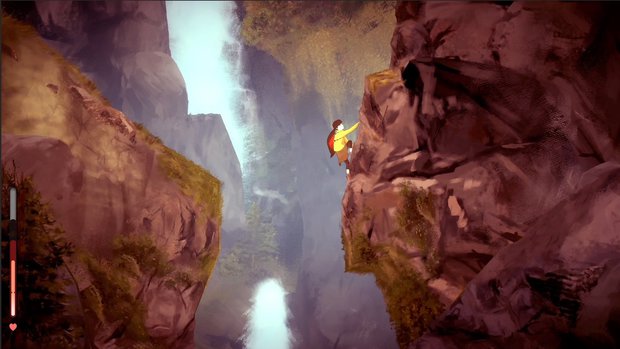
Fortunately, Moira is a fearless climber, happy to scramble up near-vertical cliff faces and jump hairy-looking gaps with only the occasional yelp of fear. She'd still be in trouble, though, if it wasn't for the fact that folks have left all manner of helpful bits and pieces scattered about, ranging from a bent fork to a rusty key and, most helpfully of all, scraps of map. These can be anything from hastily written scrawls to articles torn from newspapers, so it's not immediately obvious where they point to. Thankfully, Moira (or rather, you) can usually pick them out from the vantage point of a nearby hilltop, and finding one can lead her to sneaky shortcuts, which are then helpfully marked by little energy tornadoes.
And then there are the dancing deer. Deer are already considered majestic creatures, but in Moira's world they act as spirit guides of sorts, leading her onward as they both hop from stone to stone and tussock to hillock in time to a merry folk tune. Following them may just be a matter of hitting the right button prompts at the right moments (from a choice of two), but I found these to be some of the most delightful moments in the game, as I lost myself in the flow of racing across the hills, with the notes of the melody literally streaming out behind. Get it right, and Moira will go a long way in the right direction very quickly, getting stronger in the process, but get it wrong and she'll come thudding to earth with a resounding "oof!" (Thankfully, the deer are usually patient, letting her get up, dust herself off and keep going.)
All this happens amid some truly lovely hand-painted scenery. The layered 2D backgrounds are drawn with loose, energetic brushstrokes that give them a rich texture up close, ranging from verdant grass and wind-blown trees to slate-roofed cottages and crumbling castles. Moira and the few other characters she meets, by contrast, are presented in a simple, clean-lined cartoonish style that really helps them stand out. With her bright yellow raincoat, long flowing brown locks and exuberant animations, she jumps off the screen against the greys and greens of the countryside around her – countryside that's further brought to life by trees swaying in the wind, rain pattering, and thunderclaps loud enough to shake the screen. It's so spectacular that every so often I'd take a moment just to stand there on a mountain top, gazing at the low sun reflecting off the sea, listening to the wind while Moira recalled the history of the standing stones around her, as originally told to her in Hamish’s own voice.
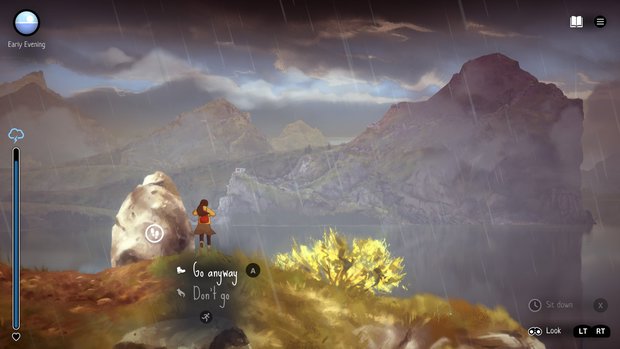
The soundtrack is a similarly evocative mix of ancient and modern folk tunes, shifting from slow, lilting laments to mellow guitar pieces to exuberant dance numbers featuring nimble accordions and merry violins. These come to the fore during the deer chasing sequences, which feature performances by the internationally known folk bands Talisk and Fourth Moon. The rest of the time, the music ebbs and flows as you explore, standing out to emphasise emotional moments before fading back below the sound of the wind and rain.
Moira herself is quite a character, and you can't help but empathise as she pants and groans her way up yet another cliff face, or shrieks when she can't quite hang on and slides back down. Along the way, she muses on everything from feeling stifled and lost at home to the remarkable sights around her and how she's never really fitted in. Via Moira’s memories of their conversations, Hamish pipes up too, now and then, with a snippet of history or folk wisdom. Both Moira and Hamish sound warm and entirely natural, making you feel like one of the family as they banter cheerfully. (Moira can also be mildly sweary, but you can toggle that off in the settings if it’s an issue.) It's not fully voiced, with many of her more offhand comments just popping up as speech balloons instead, but that didn’t matter to me; before long I wound up hearing them in my head in Moira's voice anyway!
The controls are pretty straightforward on PC, at least in principle: just run left or right, climb up or down, jump, and interact with a nearby object, using either keyboard or controller. You can also zoom out to get a better view of your surroundings, which is often pretty much essential to find your way around the complex landscape. The zoomed-out view also highlights possible paths, colour-coded by difficulty. One small gotcha is that, as lovely as the graphics are, it can be a little tricky to distinguish between (for example) a rock you can jump up onto and part of the background, and it's all too easy to miss branches in the path. It also took me entirely too long to realise that you can jump repeatedly as you're climbing to scramble up faster. That can be crucial, as Moira struggles with long climbs, panting harder until she loses her grip completely, and this can make the difference between struggling to the top and sliding ignominiously down. As it is, you'll often need to give her a short break after such exertions to get her breath back.
On that note, you'll soon find that while earthy, tomboyish Moira is amazingly capable, she's not invulnerable, as the health bar on the left of the screen testifies. Stumbling and falling depletes it, while stopping in a pleasant spot for a bit helps it recover. On a good day, under a shady tree, she'll quickly feel better, but in the driving rain it's not going to help at all. Each of her days starts bright and early at dawn, and runs through until dusk. Time passes slowly while she's exploring, but (as she'll warn you) taking certain paths can eat up hours and resting can easily do the same, especially if she has a lot to recover from. Come nightfall, you'll have to find somewhere comfortable for her to stay, as sleeping badly leaves her weaker (with a shorter health bar) the next day. Bothies (small stone cottages) are best, but a cavemouth will do in a pinch.
With all that to manage, it's all too easy to wind up with very little health and no way to make it better, or to end up miles from anywhere warm and dry, left stumbling around in the dark. (Moira does have a head torch, which comes in very handy for exploring the odd cave, but even so.) The Highlands look out for their own, however, and even if you tumble into the abyss, the screen just fades to black and she wakes up somewhere nearby, confused but healthy. You even learn a bit more about her past in the process, as you hear snippets of something that may or may not be a fairy tale. It feels less like failure than a learning experience, seasoned with a hint of mystery and magic, which seems like the point.
Moira also keeps track of her adventures in a scrapbook of sorts. The maps she finds go in there, as do Hamish’s assembled bits of wisdom and lists of the peaks she’s climbed and the items she’s found. This isn’t your traditional inventory, though; instead, when she interacts with certain hotspots you’re given the option to try plausible objects on them. The journal acts more as a memento of her journey and (for achievement hunters) a way of keeping score.
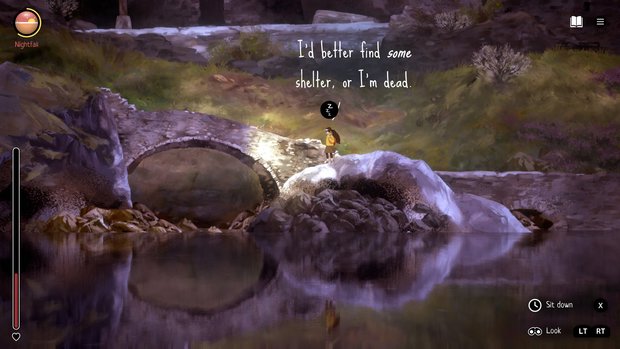
By default the game is deliberately challenging, but offers options so that it’s never unfairly so. If the deer dancing sequences are tripping you up, you can make it harder to stumble or switch to using only one button. Likewise, if you're finding some of the climbs a problem, you can stop Moira falling there too. Finally, if you've gotten yourself into serious trouble, you can revert to one of a series of recent autosaves. (That's another one that took way too long to discover, as oddly it's buried in the settings menu and not otherwise mentioned.)
Although A Highland Song is mostly about climbing mountains, spotting shortcuts, and trying not to fall in the process, it does also drop in the occasional mild puzzle. For example, there might be something interesting under a dam, if only there wasn't so much water in the way. Or an abandoned ski lift could be a great way to get up to a nearby peak, if only you could get it started again. These are always optional, and usually rely on you having stumbled across the right object earlier on. Overall, they're not too challenging, but they're often memorable for their wonderfully down-to-earth solutions: if in doubt, try hitting it with a rock, or maybe just yelling at it.
The Highlands are a big place, and it feels like there'll always be more to find and uncover. For example, aside from helping you find hidden routes, each of the dozens of peaks you can climb has a Gaelic name, hinted at by either Hamish, notes you find, or the landscape itself. And occasionally you'll run across strangers, from an old man warming his hands by the fire to a mystic in a cave and a lady who's struggling to keep the beacon fires lit. Talk to them for a bit and you'll find they're curious, concerned, and mildly helpful. You'll even see the occasional goshawk or eagle, if you look carefully.
The goal may be to reach Hamish's lighthouse by Beltane, but chances are you won't make it in time on your first go, or even your second. But don't feel downhearted; you're not really expected to, and if you straggle in a wee bit (or even quite a lot) late, Hamish will still be happy to see you, even if he chides you slightly for missing the main event. And on your next try, Moira will remember the maps and shortcuts she found before, and any objects she picked up will also stay with her. With each run (which takes around two to three hours), you'll understand the landscape a little bit more, and the crags and byways will feel more familiar, until eventually you'll come to know the place like the back of your hand. Even I, well known for having the directional sense of a drunken hedgehog, finally got there, shivering, grazed and nearly out of chocolate bars (as Moira kept reminding me), on my third attempt. And when the moment came and the credits rolled once again, the long, hard road I'd taken meant it felt truly earned. I won't spoil it, but Hamish has something to show Moira that both perfectly makes sense of and utterly upends her life.
Final Verdict
A Highland Song is a curious beast, both gentle and punishing, magical and earthy, beautiful and brutal. Which pretty much sums up the Scottish experience, really. It looks and sounds delightful, brimming with majestic landscapes and stirring folk music. And you'll learn much about Scotland's history and myths, all told in a warm and calming way. But you'll also get lost in the rain, having spent what feels like ages going round in circles after struggling nearly to a peak only to slide back down some scree. If you're easily frustrated or looking for a relaxing, stress-free experience, this ain't it. I took a while to warm to it too, but if you have the persistence to plough on through the setbacks, it has a big heart and rewards you with some uniquely beautiful moments.
Hot take
A Highland Song is a beautifully frustrating journey into the Highlands, Scottish history, and the life of a troubled teenager. Showcasing both the marvels and the menace of that rugged land, it offers a powerful sense of place, memorable tales, and a big heart.
Pros
- Gorgeous painterly graphics and stirring folk soundtrack
- Engaging story peppered with mythical anecdotes
- Warm and engaging voice work
- Challenging climbing-based exploration and light puzzling
- Plenty to find, rewarding repeated playthroughs
Cons
- All too easy to get lost or fall, which can be exasperating
- Tight time limit essentially requires multiple playthroughs
- Story, while moving, is not that detailed
Peter played A Highland Song on PC using a review code provided by the game's publisher.

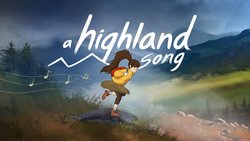
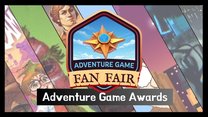
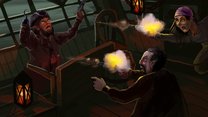

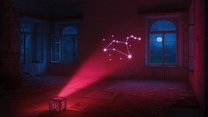
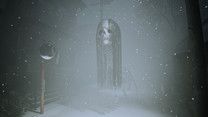
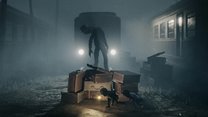
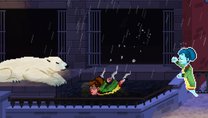

0 Comments
Want to join the discussion? Leave a comment as guest, sign in or register in our forums.
Leave a comment